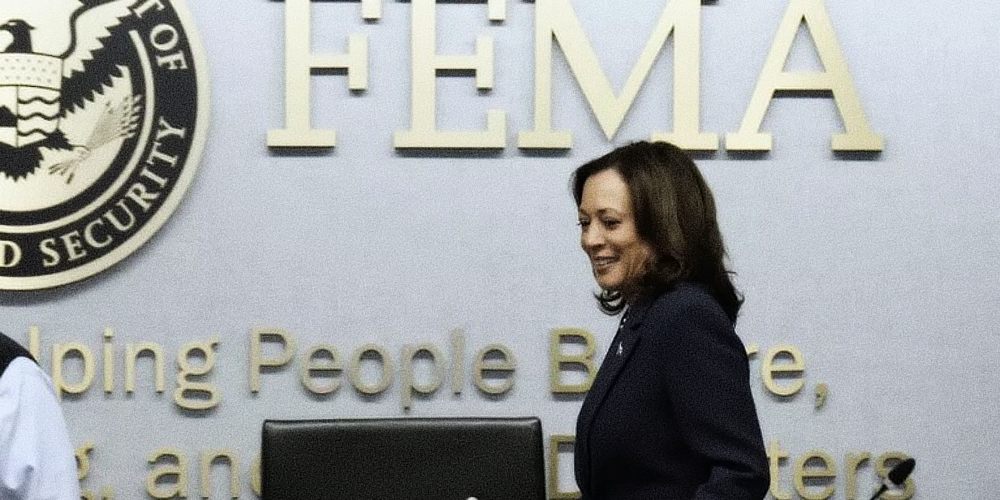(Alt-Market)—The Federal Emergency Management Agency (FEMA) was founded on April 1st, 1979 under the Jimmy Carter Administration during the height of a nearly decade long stagflationary crisis and the Iranian oil crisis. Under Executive Order 12127, its stated goal was to centralize all disaster related efforts under a single top-down entity. Specifically, FEMA ended the more localized Civil Defense Agency, which was focused on community based emergency response, and it federalized all disaster coordination under a single top-down system controlled by the Oval Office.
FEMA was eventually placed under the purview of the Department of Homeland Security, creating even more centralization. The reason for FEMA according to the government is to aid Americans during and after a national level disaster event; anything from earthquakes to hurricanes to terrorist attacks.
That said, it should also be noted that FEMA was officially created on April Fool’s Day.
The true purpose of FEMA has long been obscured but some disturbing truths have been exposed in the past. The declassification of a program called Rex 84 (tied to Operation Garden Plot) revealed that FEMA was working directly with the Department of Defense on a hypothetical strategy to round up and detain large numbers of civilians considered a “threat to national security.” In other words, FEMA was to act as a tool for helping suppress civil disturbances, it was not necessarily designed to help Americans in times of need.
This was likely always the intent behind the founding of FEMA, but George H.W. Bush and Oliver North are cited as the men that truly militarized FEMA in the early 1980s. The goal to establish a mechanism for controlling domestic political dissent and suspending constitutional freedoms was exposed not long after FEMA’s founding. Oliver North was visibly enraged when the subject was broached in a congressional hearing during the Iran/Contra scandal.
It should be mentioned that the REX 84 documents do not list FEMA as a primary agency in control of civil disturbance response. This is where the accusations of “conspiracy theory” usually come from – FEMA is not the end-all-be-all agency in charge of locking down American rebellion. In fact, FEMA’s role is strangely ambiguous and is not clearly defined. All that is known is that they are indeed an element of Operation Garden Plot and have participated in REX exercises.
There’s no denying that the secrecy around civil disturbance programs is pernicious and suggests that there is far more going on than our own government cares to admit. To uncover FEMA’s real intent all we have to do is examine how they behave.
The recent Hurricane Helene disaster and FEMA’s handling of the response across the East Coast echos the agency’s crimes after Hurricane Katrina in New Orleans in 2005. Their emergency “aid” is used as a cloak to hide efforts to actually STOP communities from helping each other and preventing outside civilian funded supplies from reaching affected residents in need.
Desperate residents during Katrina were treated like prisoners rather than citizens, gun confiscation took place in many areas and some people were shot for trying to leave locked down neighborhoods. (As a side note – this is why you should NEVER let anyone confiscate your firearms, especially if those people are sent by the government)
CNN reported in 2008 that FEMA confiscated at least $85 million in donated goods and prevented them from reaching Katrina disaster victims. This included clothing, bedding, food and medical supplies. They stored these materials for years and then GAVE AWAY the supplies long after Katrina was over. FEMA claimed the supplies were “in excess to their needs.” This report and all related articles now seem to be missing from CNN’s archives.
We just witnessed a repeat of this behavior from FEMA and the affiliated agencies within their oversight. We saw local EMS being advised to prevent civilians from helping their communities. Supplies were once agaun being blocked, people with drones were being told not to help find survivors, people with helicopters are were threatened for helping save survivors and little aid reached Helene victims for weeks. Elon Musk’s Starlink was even been prevented from providing satellite internet services to affected regions until the story went national and the Department of Transportation was forced to address the problem.
It’s Katrina all over again, and FEMA always seems to have excuses.
But why? You would think that with an election only weeks away Biden and Harris would be jumping at the chance to look competent and useful. Instead, they did nothing other that offer a $750 relief check to survivors (which might help people survive for a week) and then referred people to federal programs which take many months to benefit from.
I argue that this is all deliberate. FEMA and the federal government at large are still using Operation Garden Plot-like protocols with two goals in mind…
First, they are trying to acclimate the populace to the idea that civilians can’t help themselves and that they should do nothing. They do this by constantly interfering with civilian efforts and disrupting donations. If civilians are working on their own to save US communities from calamity then they might one day realize they don’t need the Federal Government for anything. The establishment NEEDS people to believe that they can’t survive without government aid and protection. Luckily, at least in the aftermath of Helene, it seems that many communities are working on their own to fix the situation.
If civilians start doing things for themselves, the establishment machine becomes obsolete.
Second, I suspect FEMA is testing the waters to see how much they can get away with. Katrina was a clear beta-test for martial law disguised as an emergency response. Katrina was Garden Plot and Rex-84 realized. They want to see what Americans will put up with. Helene is yet another opportunity for these agencies to apply overt control and see if Americans will conform or rebel.
If FEMA is truly sincere in their efforts to help Americans they certainly don’t act like it. The criticism surrounding Helene is ramping up and FEMA’s indignant attitude towards their own failures in unacceptable. They should be punished for failing in their duties. That is assuming they are actually failing.
Maybe they consider the tragedy of government inaction surrounding Helene a success? The underlying point is, when disaster comes your way, it’s not enough to merely count FEMA out as a source of aid. That’s obvious. But you will also have to consider the possibility that the agency will work directly against you and your neighbors should you try to help yourselves.
If you would like to support the work that Alt-Market does while also receiving content on advanced tactics for defeating the globalist agenda, subscribe to our exclusive newsletter The Wild Bunch Dispatch. Learn more about it HERE.









